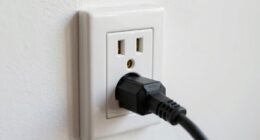Off-grid energy solutions let you power your home sustainably and independently, reducing reliance on traditional grids and lowering your environmental impact. Installing solar panels and batteries provides a reliable, self-sufficient energy source, especially in remote areas. These systems are becoming easier and more affordable to set up, offering long-term savings and greater resilience during outages. Want to discover how to make off-grid living a reality? Keep exploring to find out more.
Key Takeaways
- Off-grid systems enable homes to generate and store their own renewable energy, reducing reliance on traditional power grids.
- Solar panels, combined with advanced batteries, provide a reliable, sustainable power source for everyday home needs.
- Modern off-grid solutions are increasingly affordable and easy to install, making them accessible for typical households.
- These systems enhance energy independence, security during outages, and lower long-term utility costs.
- Adoption of off-grid energy supports environmental sustainability by reducing carbon emissions and fossil fuel dependence.

Are off-grid energy solutions the key to powering remote communities and rural areas? For many households outside the reach of traditional electricity grids, this question is increasingly relevant. Off-grid options like solar panels combined with battery storage can transform how you access power, making your home more self-sufficient and sustainable. Instead of relying on distant power lines, you can generate your own electricity directly from the sun, which is abundant and free. Solar panels are at the heart of this setup—they capture sunlight and convert it into usable electrical energy. When sunlight is plentiful, your panels produce more power than you immediately need. That excess energy doesn’t go to waste; it’s stored in batteries for later use. Battery storage is essential because it guarantees you have a reliable power supply during cloudy days or at night. With this system, you’re no longer dependent on the grid or local utility companies to keep your lights on and appliances running. Advances in battery technologies have significantly improved storage capacity and lifespan, making off-grid solutions more practical and affordable than ever before.
Off-grid solar and batteries empower remote homes with sustainable, reliable, and self-sufficient energy solutions.
Installing solar panels and battery storage can seem intimidating at first, but advances in technology have made it more straightforward and affordable. Modern solar panels are more efficient than ever, capturing more sunlight in less space. Coupled with improved battery systems, you can store enough energy to cover your household needs for days or even weeks without sunlight. This independence means you’re less vulnerable to power outages and rate hikes. Plus, it’s a clean energy solution that considerably reduces your carbon footprint, helping protect the environment.
When you’re off-grid, managing your energy becomes a proactive task. You’ll learn to optimize your usage, perhaps by running heavy appliances during peak sunlight hours or conserving power during less sunny days. Monitoring systems make this easier, giving you real-time insights into your energy production and consumption. Over time, these systems become more cost-effective, saving you money on electricity bills and maintenance costs associated with traditional power infrastructure.
In essence, off-grid energy solutions with solar panels and battery storage offer you a practical, sustainable way to power your home independently. They provide energy security, reduce your reliance on external sources, and help you live more environmentally conscious. As technology continues to improve and costs decrease, more households will find that this approach isn’t just an option but a smart, reliable way to meet their everyday energy needs. Whether you’re in a remote cabin or a rural farm, harnessing the sun’s power can truly change the way you live, bringing freedom and peace of mind in your energy supply.
Frequently Asked Questions
How Much Does Off-Grid Energy Setup Typically Cost?
The cost of an off-grid energy setup varies based on your needs, but generally, you’ll find a cost comparison helpful to understand expenses. Expect to spend anywhere from a few thousand to over ten thousand dollars. You can explore financing options to make it more affordable. Keep in mind, investing in solar panels, batteries, and inverters is essential, and planning your budget carefully guarantees a successful off-grid system that fits your lifestyle.
What Maintenance Is Required for Off-Grid Systems?
Think of your off-grid system like a garden—you’ll need to tend it to keep it thriving. You should regularly check your batteries and perform battery maintenance to prevent issues. Keep an eye on your system’s performance and troubleshoot any problems promptly to avoid bigger issues. Regularly cleaning components and inspecting connections help guarantee your system runs smoothly. With proper care, your off-grid setup will power your home reliably for years.
Can Off-Grid Energy Power All Home Appliances?
Yes, off-grid energy can power all your home appliances if you optimize solar panel efficiency and battery storage capacity. You’ll need enough solar panels to generate sufficient energy and a reliable battery system to store excess power for when the sun isn’t shining. Properly sizing your system guarantees you can run everything from lights to appliances without interruption, making your off-grid setup both sustainable and practical.
How Reliable Is Off-Grid Energy During Extreme Weather?
During extreme weather, the reliability of off-grid energy depends on your solar panel durability and battery storage efficiency. If your solar panels are designed to withstand harsh conditions, they’ll continue generating power even in storms or heavy snow. High-quality batteries ensure your stored energy remains accessible. Regular maintenance and choosing weather-resistant equipment help keep your off-grid system dependable, so you can rely on your energy supply no matter the weather.
Are Off-Grid Solutions Environmentally Sustainable?
You might wonder if off-grid solutions are environmentally sustainable. Generally, they have a positive environmental impact because they often use renewable energy sources like solar, which offers high solar efficiency. By reducing reliance on fossil fuels, you minimize greenhouse gas emissions. However, consider the environmental costs of manufacturing and disposing of equipment. Overall, with proper design and maintenance, off-grid systems can be a sustainable choice for eco-conscious individuals.
Conclusion
So, why bother with those pesky traditional power lines when you can go off-grid? Imagine never arguing over electricity bills or waiting for the power to come back on. With off-grid energy solutions, you’re basically saying, “I don’t need the grid’s drama,” and embracing the freedom of solar panels and batteries. Who knew ditching the grid could make you feel so rebellious? Live independently, save money, and enjoy the sweet irony of unplugging in style.









